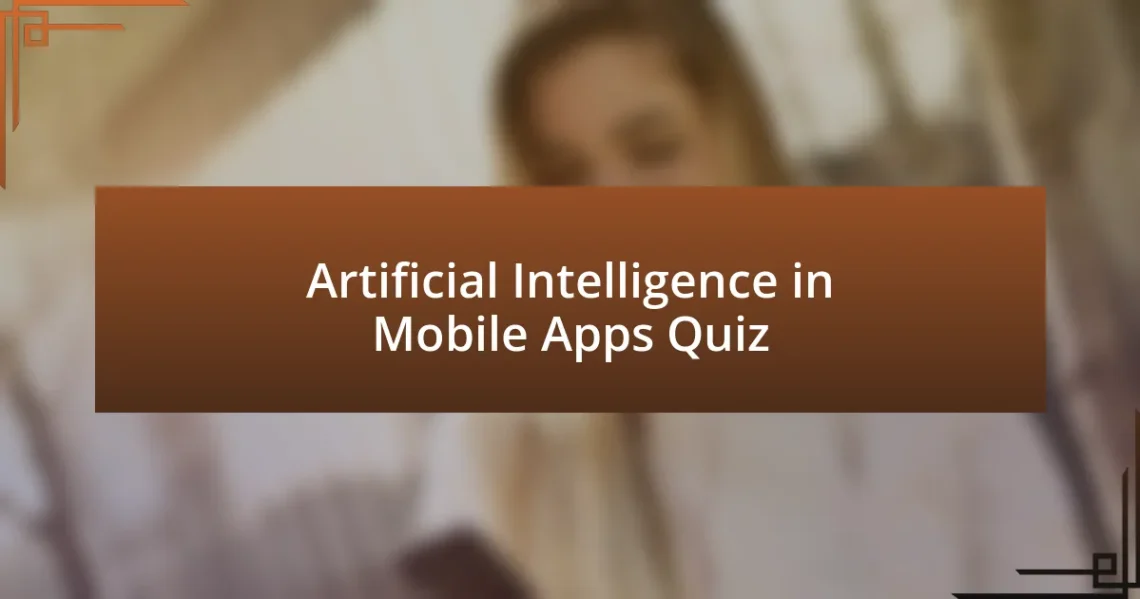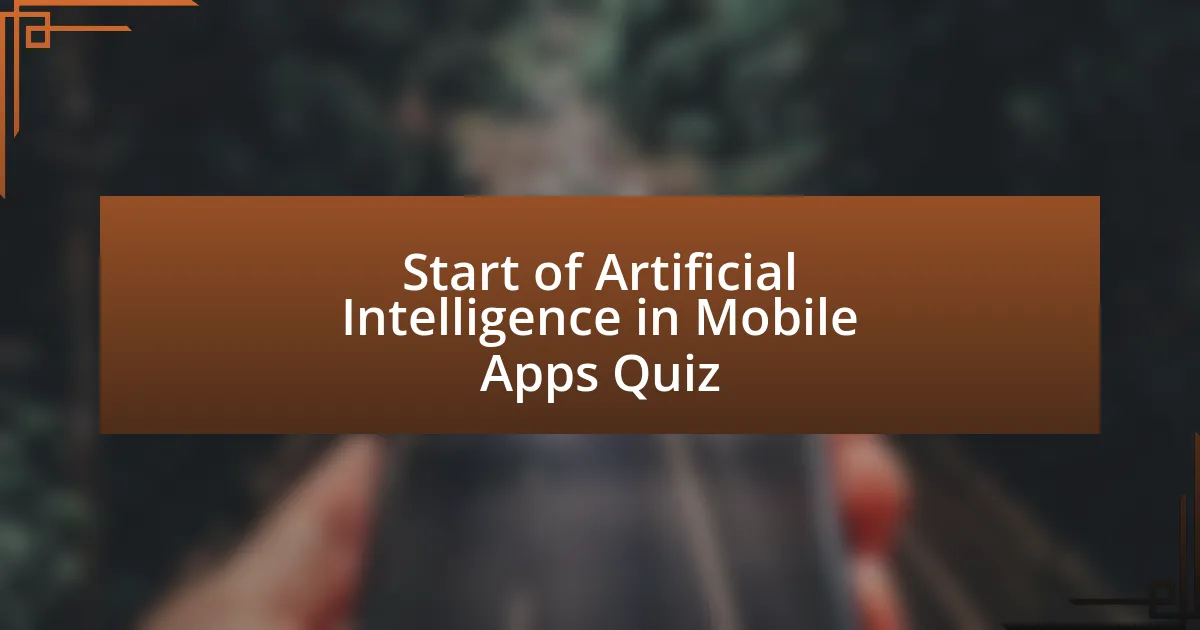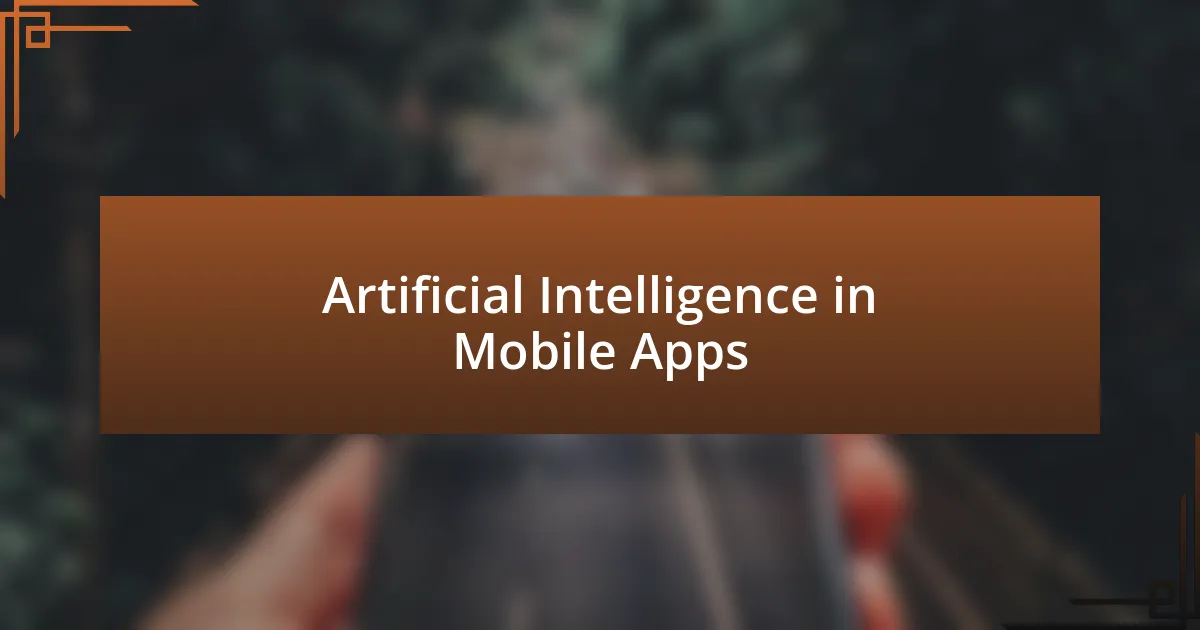
Artificial Intelligence in Mobile Apps Quiz

Start of Artificial Intelligence in Mobile Apps Quiz
1. What is the primary goal of Artificial Intelligence in mobile apps?
- To create intelligent machines that can think and act like humans.
- To reduce battery consumption on mobile devices.
- To build faster devices for improved performance.
- To enhance the aesthetics of the app interface.
2. Which AI app is designed to complete a range of tasks including answering questions and creating images?
- My AI
- Copilot
- Dropbox Dash
- ChatGPT
3. What type of AI app is Google’s Gemini chatbot?
- Chatbot
- Image generator
- Music player
- Video editor
4. What is the main function of Dropbox Dash?
- A video conferencing platform for remote meetings.
- An AI-powered search tool for organizing and sharing content.
- A photo editing software with filters.
- A file storage service for large files.
5. Which Snapchat feature is built on OpenAI’s ChatGPT technology?
- Snap Stories
- Snap Lens
- Snap Map
- My AI chatbot
6. What does Smartly focus on developing technology for?
- Game development and interactive storytelling.
- Digital marketing, including creative production, campaign launch, and performance measurement.
- Health diagnostics and patient management technology.
- Financial analysis for investment strategies.
7. What does Ally Financial’s mobile banking app use AI for?
- Generating personalized workout plans for users.
- Managing social media accounts on behalf of users.
- Answering questions, handling money transfers, and providing transaction summaries.
- Providing financial investment advice based on market trends.
8. What does Cleo specifically provide?
- Investment advice for stock trading strategies.
- Social media management and marketing analytics.
- Personal finance tracking through manual entry.
- Budgeting assistance by linking directly to a user’s bank account.
9. What is Calm primarily used for?
- Language learning courses and practice.
- Guided meditation, sleep, and stretching services.
- Music streaming and playlist creation.
- Cooking tutorials and recipe sharing.
10. What does FitnessAI use AI for?
- Managing social media accounts for fitness influencers.
- Generating personalized workouts based on user experience and goals.
- Analyzing user data for marketing strategies.
- Creating nutrition plans based on regional diets.
11. What does Youper feature?
- A fitness tracking AI that analyzes user workouts and diet.
- A mental health-focused AI chatbot that converses with users about their emotional struggles.
- A language learning AI that helps users practice new languages.
- A financial planning AI that assists with budgeting and investments.
12. What does Google Maps use AI for?
- Creating virtual maps and landscapes for users.
- Enforcing speed limits by tracking user behavior.
- Aggregating location data, monitoring traffic conditions, and predicting future traffic.
- Designing user interfaces for easier navigation.
13. What is the main benefit of integrating AI into mobile app development?
- Increasing the battery life of mobile devices while running apps.
- Creating visually appealing user interfaces for mobile displays.
- Analyzing and processing large volumes of data accurately and quickly.
- Reducing the overall development time by eliminating testing phases.
14. What does AI-powered chatbots provide in mobile apps?
- Complex discussions requiring human-like reasoning.
- 24/7 customer support, answering user queries efficiently, and completing simple tasks.
- In-person customer assistance and physical product handling.
- Basic information retrieval without real engagement.
15. What does AI enable in voice-based interactions?
- Voice effects, audio mixing, and sound editing.
- Music playback, sound recognition, and audio streaming.
- Background noise cancellation, volume control, and sound quality enhancement.
- Voice search, voice commands, and voice dictation.
16. How does AI automate repetitive coding tasks?
- By compiling and executing programs automatically.
- By manually reviewing every line of code.
- By generating boilerplate code or basic functionalities.
- By writing complex algorithms from scratch.
17. What does AI-powered tools analyze in code?
- Documentation and code comments accuracy.
- Potential bugs, security vulnerabilities, and inefficiencies.
- User interface designs and aesthetic qualities.
- User feedback and ratings from app stores.
18. How does AI improve testing efficiency in mobile apps?
- By increasing app download speeds and improving graphics.
- By automating test cases, identifying edge cases, and performing repetitive tasks.
- By providing real-time notifications for user engagement.
- By enhancing sound quality and reducing app sizes.
19. What does integrating machine learning models into apps unlock?
- Simple text processing and formatting tasks.
- Standard image editing and enhancement tools.
- Powerful functionalities like facial recognition, image recognition, and object detection.
- Basic data entry and retrieval capabilities.
20. How does AI analyze app performance data?
- By generating random data for testing purposes.
- By identifying bottlenecks that impact performance and optimizing resource use.
- By employing social media trends for design suggestions.
- By displaying user reviews prominently in the app.
21. What does context-aware apps leverage?
- Social media integration and influencer marketing for outreach.
- User preferences and interface design to enhance visuals.
- AI and location services to personalize interactions based on user context.
- Data encryption and cybersecurity protocols for safety.
22. What is user personalization in AI-powered apps?
- Ensuring all users receive the same content regardless of preferences.
- Automating app updates without user input.
- Collecting user data for marketing purposes only.
- Adapting content and functionality based on user preferences and behaviors.
23. How does Netflix use AI for recommendations?
- By suggesting popular titles based on current trends in cinema.
- By streaming movies at higher quality based on user preferences.
- By using an advanced algorithm to recommend shows and movies based on user viewing history.
- By allowing users to manually select what to watch from a list.
24. What percentage of users watch Netflix title recommendations?
- Nearly 30%.
- About 90%.
- Around 50%.
- Approximately 80%.
25. What does Empik Go offer users?
- Personalized audiobook and eBook recommendations based on usage history.
- A subscription for unlimited music streaming services.
- A platform for sharing personal travel experiences and stories.
- Exclusive access to online gaming and competitions.
26. How does predictive analytics work in mobile apps?
- By solely relying on user input without any data processing.
- By gathering user data and applying machine learning algorithms to detect patterns and predict future behavior.
- By using static algorithms to analyze user preferences without updates.
- By providing random recommendations without any analysis.
27. What does predictive analytics help eCommerce apps do?
- Suggest items users might want to buy based on past purchases and browsing history.
- Monitor website traffic to enhance server performance.
- Analyze customer support tickets for service improvements.
- Create promotional content based on current trends.
28. What does dynamic UI powered by AI bring to mobile apps?
- Flexibility and adaptability by adjusting layout and content in real-time based on user preferences.
- Increased battery life by reducing app resource usage immediately.
- Higher download speeds during content updates for users.
- Enhanced security through advanced encryption algorithms installed.
29. How does Google News adjust its content?
- Through seasonal themes and advertising inputs.
- Based on user location, current events, and reading habits.
- According to user feedback and app updates.
- By trending topics and user demographics.
30. What AI technologies are enhancing user experience in mobile apps?
- Text-only interactions and offline capabilities.
- Voice recognition, image recognition, and predictive analytics.
- Large data processing and simple algorithms.
- Basic app functions and manual updates.

Congratulations! You Have Successfully Completed the Quiz
Thank you for taking the time to complete our quiz on Artificial Intelligence in Mobile Apps. We hope you found it both engaging and informative. This quiz was designed to deepen your understanding of how AI technologies are revolutionizing mobile applications. You may have learned about various AI features, use cases, and their impact on user experience and efficiency.
As you navigated through the questions, you likely discovered new insights about how AI personalizes app interactions. Additionally, you might have recognized the ethical considerations that come with using AI in mobile technology. These topics are vital for anyone interested in the future of mobile app development and usage.
For those eager to explore more, we invite you to check out the next section on this page. It offers a wealth of information about Artificial Intelligence in Mobile Apps. Expanding your knowledge in this area will provide you with a better understanding of the trends shaping our digital world. Happy learning!

Artificial Intelligence in Mobile Apps
Understanding Artificial Intelligence in Mobile Apps
Artificial Intelligence (AI) in mobile apps refers to the integration of sophisticated algorithms and machine learning techniques to enhance user experiences. This technology enables apps to perform tasks that typically require human intelligence, such as recognizing speech, understanding user behavior, and providing personalized recommendations. The use of AI in mobile apps improves functionality and efficiency, making them more intuitive and responsive to user needs.
Key Features of AI in Mobile Applications
Key features of AI in mobile applications include natural language processing, image recognition, predictive analytics, and personalization. Natural language processing allows apps to understand and respond to user queries in human language. Image recognition enables apps to identify objects or people in photos. Predictive analytics can forecast user behavior based on historical data, while personalization tailors the app experience to individual users. These features significantly enhance usability and engagement.
Popular Applications of AI in Mobile Technology
Popular applications of AI in mobile technology include virtual assistants, finance management apps, and health monitoring applications. Virtual assistants like Siri and Google Assistant use AI for voice recognition and task automation. Finance apps like Mint utilize predictive analytics for budgeting. Health apps such as Fitbit analyze user data to provide health insights. These applications demonstrate AI’s versatility and impact across different sectors.
Challenges of Implementing AI in Mobile Apps
Challenges of implementing AI in mobile apps involve data privacy concerns, algorithm bias, and resource intensity. Ensuring user data is secure while complying with regulations is crucial. Algorithm bias can lead to unfair outcomes, compromising user trust. Moreover, AI algorithms can be resource-intensive, affecting app performance on devices with limited processing power. Addressing these challenges is vital for effective AI integration.
The Future of AI in Mobile Applications
The future of AI in mobile applications holds potential for advancements in voice and image recognition, improved personalization, and augmented reality features. As technology evolves, AI will likely enable deeper insights from user data. Enhanced interaction through natural language interfaces will become commonplace. Moreover, combining AI with augmented reality will create immersive experiences. The continuous evolution of AI will significantly shape mobile app development in coming years.
What is Artificial Intelligence in Mobile Apps?
Artificial Intelligence (AI) in mobile apps refers to the integration of advanced algorithms and machine learning techniques that enable apps to perform tasks typically requiring human intelligence. This includes functionalities such as voice recognition, image recognition, personalized recommendations, and predictive text. For instance, AI-powered assistants like Siri and Google Assistant can understand and respond to user queries, enhancing user interaction and experience.
How does Artificial Intelligence enhance Mobile Apps?
AI enhances mobile apps by providing personalized experiences, improving efficiency, and automating tasks. It analyzes user behavior and preferences to offer tailored content and suggestions. For example, Netflix uses AI algorithms to recommend shows based on viewing history, significantly increasing user engagement. In addition, AI-driven chatbots improve customer service by providing instant responses to user inquiries.
Where is Artificial Intelligence commonly used in Mobile Apps?
AI is commonly used in various mobile apps, including social media, e-commerce, and productivity applications. For instance, Facebook employs AI for content moderation and targeted advertising. E-commerce platforms like Amazon use AI for customer service and personalized shopping experiences. Health and fitness apps utilize AI for tracking user progress and providing customized workout plans.
When did Artificial Intelligence start being integrated into Mobile Apps?
Artificial Intelligence began being integrated into mobile apps in the early 2010s with the advent of more powerful mobile devices and advancements in machine learning. The introduction of voice assistants like Apple’s Siri in 2011 marked a significant milestone in the adoption of AI in mobile applications. Since then, the use of AI has steadily increased as technology has evolved.
Who benefits from Artificial Intelligence in Mobile Apps?
Both users and developers benefit from AI in mobile apps. Users enjoy enhanced experiences through personalized features, improved efficiency, and better service. For developers, AI provides insights into user behavior and preferences, allowing for better app optimizations and targeted marketing. This dual benefit drives growth in mobile app usage and development.




